Drama Review: Mr. Brain (TBS, 2009)
(Neuro)Science Fiction
by Ender's Girl
The Cast:
Kimura Takuya, Ayase Haruka, Mizushima Hiro, Kagawa Teruyuki, and a blinding array of Japanese TV stars! stars! and more stars!!!
In a Nutshell:
The Institute of Police Science’s resident forensic eccentric Tsukumo Ryusuke uses his unique nose (and brain) for detective work to help crack the most perplexing (and sensational!) crimes in Japan.
(SpoilLert: Veryyyy…)

I Come with the BRAIN!!!
Police procedurals can be a great source of edutainment--or entertainment with some educational or instructive value--so long as you don’t expect well-rounded character development, thematic complexity, and profound philosophical insights about Life, lol. The upside of police procedurals is that their episodic nature requires little emotional investment in the main characters, be they homicide detectives, forensic investigators, counter-terrorism operatives, or what have you. After all, the crime-solving process is the Main Attraction here, and the human characters are just, well, tools of the trade. Hence, police procedurals are considered howdunits as much as whodunits. But even the best police procedurals have inherent plot loopholes and unrealistically prompt (and conclusive) evidence recovery/analysis and case resolution. Many procedurals suffer from lazy writing, using slapdash deduction and expedient deus ex machina revelations/confessions to tie up the elaborately laid-out, *cough* convoluted *cough* plots--all in just one episode! Wow! BUT whatever lapses in content or credibility are made up for in STYLE. Procedurals these days don’t stint on production design and tend to overcapitalize on sleek, well-stocked designer labs, futuristic techie gadgetry, and the inordinate use of CGI just to glam up police work and forensics--when in reality these professions are probably more toil and drudgery than anything else, lol. Well, that’s television magic and escapism for ya.
As a police procedural, Mr. Brain is--well, really just that, a police procedural. Typically slick and soulless, yes, but also flashy and splashy, snazzy, pizzazz-y, and all that jazz-y. Some cases are more satisfying than others, and overall the drama is an entertaining (if mindless) watch. You’ll probably fuhgeddabout each case once the end credits start rolling (lol), but no worries, you won’t be missing them at all.
“They call me MISTER Brain!!!” (with deepest apologies to Sidney Poitier)
When news first broke that Mr. Brain was in production, my eyebrows shot past my hairline. Holy hippocampus, Batman! Kimura as a science whiz? A walkin’ talkin’ noggin? Fo’ realz? Heh heh. Now, why did I consider it a stretch of the imagination for Kimura to play an intellectual? Maybe it’s because I’m just so used to seeing him in average-joe roles, characters who are talented in other ways (e.g. sports, music, etc.) but always of normal intelligence. (I'm trying to sift through the jumble of Kimura dramas I've seen, and I can't recall him playing someone so exceptionally smart; the closest he ever got was his character on One Million Stars Falling from the Sky, a person gifted with a photographic memory.) But I was truly hoping his latest turn as a crime-busting brainiac would be a well-written one, and not some 2-D caricature laden with all the annoying egghead stereotypes.
The prologue of Episode 1 lays the groundwork for his character: good-hearted gigolo Tsukumo Ryusuke meets a freak accident (fortuitous or not? you be the judge) that somehow re-wires his brain and renders his post-surgery self exceptionally bright, but also with a radically altered personality. As the titular Mr. Brain, Tsukumo Ryusuke feels like a hybrid of a few familiar faces in Western police procedurals, each one with his unique brand of “requisite quirkiness.” Tsukumo is 20% Adrian Monk of Monk (The Benign Crackpot), 20% Charlie Crews of Life (The Nonconformist with a Fruit Fixation), 20% Gil Grissom of C.S.I. (The Science Geek)... and 40% Giddy Schoolboy, all skips and giggles and childish innocence. (It’s ironic that for someone who used to dispense sexual favors for a living, Tsukumo’s post-op self is so... neuter, the freak accident having suppressed his sexual urges.) I was still very much entertained for the most part, and Kimura did manage to keep his performance whimsically funny at times... But ICONIC? Uh-uh. Kuryu (Hero) was iconic. Halu (Pride) was iconic. Sena (Long Vacation) was iconic. But Mr. Brain? Nopee.
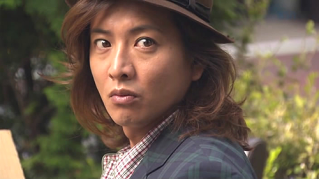
Oh, Kimura’s performance wasn’t BAD, but there were times when I found myself wishing that he had let himself go, as in just go. Maybe the Idol in him didn’t want to play it too weird? But, but--weird is good! I just wish he had gone all out with his character’s eccentricity and held nothing back. Sure, Kimura came fully armed with Tsukumo’s portfolio of quirks, like the dandified outfit (SO outlandish you could wear it to a J-Pop concert--as a performer, haha), the pet gerbil (or animal familiar, lol), the maniacal laugh, the banana addiction... But such mannerisms and character embellishments were used rather erratically, as if turned on and off by a switch according to what the scene required. These foibles of his didn’t really feel organic to the character... they were just add-ons. Most of the time I could still see KimuTaku the Actor just beneath the zany traits, especially during the more serious scenes. My best friend said that for her it was like “seeing the inside of a watch, with all the moving gears and screws.” Monk was totally neurotic, but still totally himself. Jack Sparrow (now there’s the Quintessential Crackpot! *flashes rocker sign*) was totally, incorrigibly screwy, but still totally himself. YamaPi played a complete flake on Nobuta wo Produce, but I always felt he was 100% into his character. I never thought the day would come when I’d say this, but YamaPi’s Kusano Akira felt more real to me than Kimura’s Mr. Brain, who just felt like a half-cooked egg...head, lol.
Kimura’s hair in this drama is a character in itself, and so merits its own paragraph, lol. TEH HAIR = eeeep!!! I seriously was not digging the cascading caramel waves with their ripe apricot highlights... Gilderoy Lockhart meets... Farrah Fawcett (R.I.P.), lol. But I hafta admit that his coiffure went very well with the rest of his Neo-Victorian ensemble--top hat! kooky three-piece suit! denim pants tucked into boots! (No “Best Jeanist” citations for Tsukumo I s’pose, oh no no...) So, I take back calling Kimura “The Mad Hatter” in my Nemureru Mori review, because Tsukumo Ryusuke deserves the appellation BY FAR, lol. (But, oh, KimuTaku, what have you done to your FACE? Should’ve stayed off the Botox and collagen fillers, honey. Now you look much, much older than 36. Tsk tsk.)

Pinky and the Brain
Ayase Haruka as Tsukumo’s Brain in Training? Super blah. I don’t blame the poor chit for not standing out amid her more over the top colleagues and splashy guest stars all jostling for the spotlight. Her character Yuri Kazune is little more than ornamental and shares as much (or as scant) screen time as the other lab rats in the cast. She doesn’t come across as particularly bright, either, and you wonder how she even got into such an elite research facility. And Ayase and Kimura’s on-screen chemistry is as incendiary as a wet rag: how can there be any romantic sparks between them if the professional sparks are nil to begin with? The drama throws in a generous number of Potentially Romantic Moments (like their little idyll on the grass in the Nakama Yukie episode), and yet you end up feeling... nothing. (But at least the monkey-to-assistant running gag was mildly amusing. Ah, the joys of evolution.) I’m fond of Ayase, but she brings nothing to the table in this drama. The producers could’ve cast any starlet as Tsukumo’s assistant, and gotten the same results.
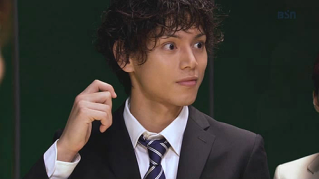
Rat’s Nest and The Howler: Tokyo’s Finest?
Mizushima Hiro plays the J-drama standard-issue Bumbling Rookie Detective, Hayashida Toranosuke. Great! More comedic fodder for the Jdorama Laugh Machine! Durr. I didn’t hate him, but he was bloody annoying at times, because he managed to be so dimwitted AND gullible (yesss, Inspector, ghosts are real, and so are Invisible Men) AND gutless--all at once. How did this sissy-boy ever become a homicide detective? And what in heaven’s name was that greasy black mass sitting on his head? I couldn’t decide if Hiro looked more Medusa than some third-rate Michael Jackson impersonator. Seriously, does that boy style his own hair? Or does he pay an embalmer-slash-taxidermist to do it for him?
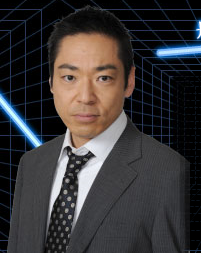
But Hayashida’s mercurial superior Tanbara Tomomi (Kagawa Teruyuki) is a scream! Because he likes to... scream at everyone he meets along the way, lol. I’ve dubbed him The Howler for this very reason. But he does provide many of the drama’s funniest moments, particularly those capitalizing on his irrational hatred of Tsukumo’s pet gerbil--like the scene in Episode 3 when Tanbara goes berserk at the sight of the poor creature Tsukumo shoves in his face, lol. Tanbara and Tsukumo have the best chemistry on the show, too. The senior detective’s character is also developed to a satisfying degree because you really witness the transformation in his demeanor towards Tsukumo, so that in the last two episodes they are actually friends. And beneath all those histrionic outbursts and face-scrunching, Kagawa Teruyuki’s intelligence and versatility as a character actor are indisputable. The powers that be over at TBS were right on the money in casting this veteran.
Prologue: The Host is Toast!
Okay, so Tsukumo used to be a peroxide-blond gigolo in a previous life. Interesting. Hirosue Ryoko cameos as Jilted Barefoot Lady before a Shoe Store Window whom Tsukumo meets on the street. (Oh, oh--it’s Sena! And that that little piano prodigy from Long Vacation! Well, she ain’t so little any more… Man how time flies! *shakes head*) But, oh, Hirosue Ryoko, why did you even appear in this drama? To be a glorified episode filler and ratings booster? Ryoko’s cameo would’ve served the drama’s purpose had her story arc with Tsukumo found closure towards the end of Mr. Brain. Her arc could have bookended the drama and provided a nice symmetry to the story. Tsukumo’s character should also have been developed enough so that by the time he meets Ryoko again at the drama’s close, his own story of self-discovery will have come full circle as well. But to have a better-fleshed personal story for Tsukumo would have meant extra episodes--more than this drama’s eight. Without a satisfying conclusion, Hirosue Ryoko’s cameo became just a distracting (though very pretty) superfluity that didn’t tie in with the rest of the story.
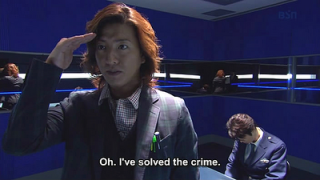
Infernal Affairs (Episode 1)
It’s a no-brainer that Mr. Brain is dressed to impress. TBS certainly pulled out all the stops for this mega-production, whose first episode alone is this sprawling 90-minute spectacle of exploding cars! burning buildings! monster pile-ups! big-name stars! The production values are reminiscent in style of C.S.I. and even Alias, with the bird’s-eye shots of the bustling Tokyoscape, snappy editing and clever juxtapositions, and showy set pieces like the IPS research hub, a gleaming, germ-free metropolis of glass and steel where robots and holographic computers and giant LCD screens roam free among humans… Mr. Brain screams MONEY (and *cough* bloated budget *cough*), and you can’t help but wonder how TBS planned to recoup its expenses.
Ah, terrorism. What better way to kick off a detective show than the favorite whipping boy du jour of police procedurals? Ah, Yusuke Santamaria. What better actor to play a Double-crossing Dude with a Gambling Problem (*cough* Nemureru Mori *cough*) than good ol’ Santamaria? Heh heh. His guest appearance is also kept short, since it really is no more than a plot device to introduce Tsukumo 2.0, Gifted Child (lol) to viewers and the IPS researchers.
Episode 1 is actually structured as two short sub-episodes (the Ryoko and Santamaria cameos, respectively) and one longer one, a more elaborate case involving crosses painted with blood and corrupt bureaucrats and bid-rigging conspiracies and the first of many, many fMRI machine appearances. But it really is kind of stupid that the real Baddie blows up his own house just so he can eliminate his wife and aide. Talk about overkill, hahaha.
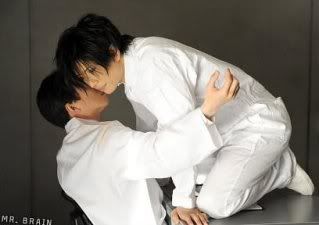
Defense Against the Dark Arts (Episode 2)
Ack! It’s Gackt! Well well well... so this is the famous Gackt, that one-voweled rock star and Hannibal Lecter wannabe with a penchant for the grisly (and the gristly, haha). But whereas Mr. Hopkins (oh, excuse me, that’s Sir Anthony for you, lol) spooked the bejibbers out of me with just one look, Gackt in Mr. Brain was... eerie at best, but not spine-tingling, piss-in-your-pants scary (though not for lack of trying; the poor man really did his best, lol). What really scared me about Gackt wasn’t the diabolical giggling and the little knowing sidelong glances he fed the camera. What really scared me was that cosmetically enhanced face of his, and just thinking about the number of times that guy must’ve gone under the plastic surgeon’s scalpel made my hair stand on end, lol. (Cut and paste, cut and paste...)
Anyway, this episode went to great lengths to convince the viewers (and incredibly obtuse homicide detectives *cough* Rat’s Nest *cough*) that Gackt is this revenant (ooooh!) out to exact revenge on his executioners. But if the hanging had been carried out, then obviously the recent killing spree would have to be the work of a copycat. Obviously. (Well, hello there, Koyuki.) But once the connection between the victims and Koyuki’s slain husband is established, then it’s mystery solved. So Koyuki has the motive all right, but as for the means? Yeah, right. Granted, she probably could’ve pulled off the first two murders using the advantage of surprise and superstition, but her third (and final victim) was already on his guard. There’s NO way a willowy young woman could’ve stabbed and killed an experienced police officer who already suspected her in the first place. Bah, shoddy logic. Frankly, I would’ve had more fun watching Gackt and Koyuki team up instead: he’d cut up their victims’ limbs for supper, while Koyuki would drink their blood--as a reprise of her role as the Lamia Queen in that B-movie Blood: The Last Vampire. T’would have been interesting, ne?
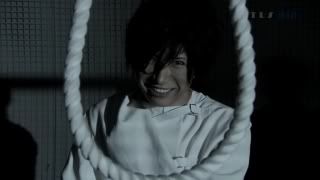

Doctor Death (Episode 3)
Ehhh. Something about an invisible man, gerbils on the loose, hospital supply rooms fraught with death, CCTV blind spots, word games, corrupt physicians, and amygdalae glowing red with love... and two doctors with a prescription for murdah! murdah! Hehehe. Well, the first one (Koichi Mantaro as the gray-haired Dr. Chihara) had a credible motive, but the means were downright laughable. So by sidling against the hospital walls, he somehow managed to avoid all surveillance cameras AND medical personnel? That “invisible man” game plan was just too chancy. And as for Kame’s motive, hmmm, let’s see: so he planned to stiff Aibu Saki to keep her from ratting out Doctor Death, so it wouldn’t be disclosed in the investigation that Kame had been receiving bribes, so Kame could keep his hospital tenure, so Dr. Kame could continue his... research projects. Wow. So... amazing. Amazingly unconvincing, lol.
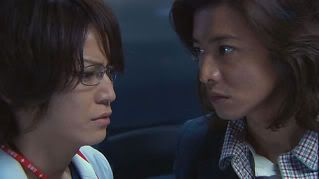
Aibu Saki makes full use of her dramatic prowess by acting lobotomized for 80% of her screen time. Nobody, and I mean nobody does Pleasantly Vacant better than this little lady. (Ganbatte, Aibu Saki! Ganbatte!!!) And as for Kame, Kame, Kame... it’s not that he SUCKED, but his character was just this nonentity, and the only time when I felt anything for him was in those final moments after the Big Reveal, when Aibu Saki haltingly asks Kame what the problem is, and he answers her with voice breaking, remorse and shame written all over his face. But it’s hardly fair to blame Kame for single-handedly dragging the ratings down to 16% (the lowest of all 8 episodes). This whole episode was a drag, period. The writing was terrible, with the flimsiest and least convincing crime plot in all of Mr. Brain, and the direction, editing and even the acting felt so static, which all in all made Episode 3 the worst of the lot (despite also being the most hyped).

Memento (Episodes 4-5.5)
Classical music. A sister’s sacrificial love. Whole notes scribbled cryptically on a score sheet. Cover-ups and blackmail. Memory games. Plagiarizing concert pianists. Pandora’s boxes... all make for an interesting whodunit, I’ll say. Mr. Brain picks up from this point, with the characters and story arcs having more emotional pull than in the preceding episodes. And this is the episode where all the lab rats at IPS actually figure actively in the plot, and don’t just put in a token appearance. For a change, the Perp here is really flat-out evil, and the full extent of his villainy is revealed in the numerous flashbacks. You also feel doubly bad for Piano Boy for getting victimized twice over by the same Baddie, who appropriates Piano Boy’s compositions using blackmail as leverage, and then frames the poor kid for the murder of his nee-chan’s fiancé. I liked the character of Piano Boy alright, but my beef is with the actor who played him. Sato Takeru was a terrible casting choice. Never mind the artfully mussed-up hair and cosmetically enhanced features that scream JOHNNY!!! in every way (although interestingly enough, the kid’s from a different agency). Sato Takeru apparently thought that he was playing someone with autism, and not a memory disorder. Remember the scene where Evil Virtuoso and Mr. Brain play the memory game in Piano Boy’s studio? What’s Piano Boy doing? Sitting in the background staring vacantly into space, is what, that heavy-lidded face of his as empty as a blank score sheet. LMAO!!! Short-term memory loss just means you forget about what you did or said or who you met in the past [insert unit of time] or so, as your brain re-boots itself like clockwork. Short-term memory loss doesn’t turn you into an imbecile, fer cryin’ out loud. That Takeru boy could learn a thing or two from Guy Pearce’s mind-blowing performance in the 2000 film, Memento. Honestly.
My other bone to pick with this particular crime plot is that it straddles Episode 4 and half of 5--bad, bad practice for an episodic procedural, man. Either finish everything in a single episode, or fatten the story arc into a 2-part mega-episode, as many TV shows have done. But don’t leave the viewers hanging, dang it. 1.5 episodes is plain idiocy.
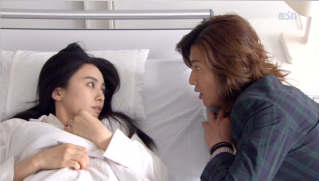
Trinity (Episodes 5.5-6)
Jekyll-and-Hyde cases are nothing new to crime fiction because the multidimensionality of a character with Dissociative Identity Disorder/Multiple Personality Disorder always makes for a more interesting murder suspect. But assigning criminal liability to a defendant suspected with MPD can be a tricky, tricky thing, since there is still much debate in the medical/legal community as to the validity of MPD as a pathological condition--and not just as a social construct. (That is, assuming the suspect isn’t faking it, which happens a lot in real life.) Besides, it’s always interesting to see where MPD stands in the legal system, as many defendants in real life do get acquitted (or get off with a lighter sentence) after convincingly deflecting criminal responsibility towards one (or more) of their so-called multiples.
Nakama Yukie deserves the Best Guest Star award for her portrayal of Akiyoshi Kanako, a young woman split into three distinct personalities, with her violent alter responsible for the executions of three people somehow connected to her abduction as a young girl. This episode is also the most painful to watch because of the sheer inhumanity of the injustice done to Kanako. This wasn’t a crime, it was an abomination. And when she puts a bullet in her tormentor’s head in that abandoned lot, you feel as she must have felt: not an ounce of remorse, just the grim satisfaction rising above the hatred and humiliation and disgust. Later it gets proven that her MPD is just an act, that there are no alters representing her fragmented consciousness. But I don’t believe she wasn’t SOME KIND of crazy--even if it wasn’t MPD per se, then some other type of mental disorder (like a psychosis). You don’t get locked up in a hole for 15 years, enduring unimaginable abuse, and come out of the trauma compos mentis. You’ll be forever damaged, and you’ll live in that prison for the rest of your life. I was hoping Kanako would plead the insanity defense later on, because there’s NO way she could’ve been sane.
My few bones to pick with this episode: (1) So Kanako drops enough clues to make a convincing MPD case before the police (e.g. eating from the bento box, covering the sensei’s corpse with the blanket, etc.). But we’re also shown scenes where she still acts like she has MPD even when there’s nobody around to benefit from her “performance,” like the time when Fragile Kanako stands outside the convenience store and “discovers” the gun used by Killer Kanako. Fragile Kanako gives a little horrified gasp and hurriedly tosses the gun into the trash bin--but why do that if nobody was around to watch her little scene? The episode makes too strong a case for the MPD angle, but when it is later disproved, the writing lacks the sophistication to find a way around such narrative loopholes.
(2) Nakama Yukie may have given the strongest performance of the all the guest stars, but I didn’t feel like she was deglamorized enough, or that her appearance and behavior bore enough signs of her daily torment. What would one really look like after crawling out of that vermin-filled pigsty? Wouldn’t your hair be lank and matted, your unwashed body covered with scabs and sores and flea bites, your jagged nails caked with dirt? Wouldn’t your bones be rickety from Vitamin D deficiency and your muscles weak from disuse? And as you scrabbled out of that hellhole and tottered out into the open, your senses awash with light and color and sound and the smell of grass on wet earth--for the first time in 15 years!--would you really, truly still look human? And more importantly, would you still ACT human and manage to re-integrate yourself into society, much less have the presence of mind to track down and murder three people?
This brings to mind the 2003 Park Chan-wook film Old Boy, where Choi Min-sik plays a family man who (for no apparent reason) is abducted and imprisoned for 15 years in what looks like a motel room with bars. He manages to escape, but his confinement and emotional isolation have screwed up his ability to control his most basic of urges: food and sex. Upon his first taste of freedom, he acts like a wild animal on the loose in society, and to think he was already a grown man when his imprisonment began. On the other hand, Kanako was a child when her suffering began, and so was deprived of all normal emotional and psychological development. I don’t think I’m being unreasonably demanding of Kanako’s portrayal. If the writer/director/producer didn’t wish to uglify Nakama Yukie too much, or turn her character into little more than a beast (which I believe she would have been, given her circumstances), then they shouldn’t have made Kanako live through hell for that long a time.
X Marks the Spot (Episodes 7-8)
Oh looky, another When Bad Things Happen to Good People! revenge plot, bringing this drama’s total haul to 3 revenge-driven cases out of 6. Interesting. But I wish the writers had diversified the criminal motives because revenge plots can get tiresome, especially when it’s obvious the drama doesn’t want to make the Perps look too bad. Still, Kamikawa Takaya gives a solid performance as a wrongly convicted man out to get the people who framed him. And I had fun watching Tsukumo get all riled up (for once) because he knew he had met his equal, and nailing the Perp had become a personal thing for him. This episode also raises an interesting point about the limitations of evidence recovery and analysis, and how old crimes can be turned on their heads as new forensic technology is developed. So even if the Real Baddie, Smirkmaster Nonpareil Takei Kohei (Ichikawa Ebizo) gets off the hook for now, there’s a possibility that future technology will expose him as the Mastermind. (Would that it were sooner, because his character is close to useless. We never even see him WORKING as the head of the Anti-Organized Crime department. He oughtta be fired for spending his days loafing around the police HQ lobby and sneering randomly at people while sucking on fruit drops of every flavor and color.)
My biggest gripe about this crime plot is this: Hiro should’ve died. For two reasons: (1) There’s NO WAY he could’ve survived that blast, given his proximity to the bomb. We all saw how the explosion shattered the window panes--I mean, c’mon. (2) The death of a cop (a rookie at that) would’ve created a stronger emotional impact on the viewer, plus it is more grounded in reality: it’s a dangerous world out there, and working in law enforcement--to serve and protect--means death is just another occupational hazard. This has nothing to do with my dislike of Rat’s Nest character; but that rookie should’ve died. And for the drama to treat his (very minor) blast injuries as a source of “funny” moments and cheap laughs--like the time when Rat’s Nest tries to break out of the hospital so he can “help” Tsukumo and Detective Tanbara, leg casts and arm slings be damned!--made things even worse. I was not amused.
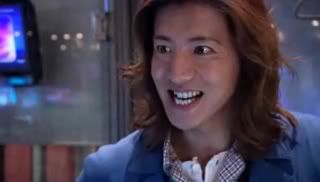
Goodbye, Mr. Brain
Random last comments:
- Snakes on a plane! It’s Shingo!!! On a plane! Lol. Okay, so that cameo was totally random (not to mention downright impossible in a post-9/11 world), but as a shout-out to J-drama (and SMAP) fans, it was priceless.
- Plus, those little animated tidbits from the Wonderful World of Neuroscience were a fun and diverting (and not to mention clever) way to explain scientific concepts in layman’s terms.
- And I must say that this drama could not have chosen a better theme song than Van Halen’s (Hey, Say) JUMP! (lol). That infectiously zippy track (IMO the highlight of each episode, heh) had my dopamine and serotonin receptors abuzz with amusement.
- Mr. Brain isn’t Kimura’s best drama, or Kimura at his best--not by a mile. But, well. At least he can say he did a police procedural, and now he can move on, lol. I still hope he chucks the Unlikely Hero template for now and goes back to doing romantic dramas, which are his real métier anyway. (But don’t worry KimuTaku, I still love you from the bottom of my... hypothalamus... You give my limbic system happy happy time, yes? Hahahahaha *E.G.’s brain self-destructs*)
by Ender's Girl
The Cast:
Kimura Takuya, Ayase Haruka, Mizushima Hiro, Kagawa Teruyuki, and a blinding array of Japanese TV stars! stars! and more stars!!!
In a Nutshell:
The Institute of Police Science’s resident forensic eccentric Tsukumo Ryusuke uses his unique nose (and brain) for detective work to help crack the most perplexing (and sensational!) crimes in Japan.
(SpoilLert: Veryyyy…)

I Come with the BRAIN!!!
Police procedurals can be a great source of edutainment--or entertainment with some educational or instructive value--so long as you don’t expect well-rounded character development, thematic complexity, and profound philosophical insights about Life, lol. The upside of police procedurals is that their episodic nature requires little emotional investment in the main characters, be they homicide detectives, forensic investigators, counter-terrorism operatives, or what have you. After all, the crime-solving process is the Main Attraction here, and the human characters are just, well, tools of the trade. Hence, police procedurals are considered howdunits as much as whodunits. But even the best police procedurals have inherent plot loopholes and unrealistically prompt (and conclusive) evidence recovery/analysis and case resolution. Many procedurals suffer from lazy writing, using slapdash deduction and expedient deus ex machina revelations/confessions to tie up the elaborately laid-out, *cough* convoluted *cough* plots--all in just one episode! Wow! BUT whatever lapses in content or credibility are made up for in STYLE. Procedurals these days don’t stint on production design and tend to overcapitalize on sleek, well-stocked designer labs, futuristic techie gadgetry, and the inordinate use of CGI just to glam up police work and forensics--when in reality these professions are probably more toil and drudgery than anything else, lol. Well, that’s television magic and escapism for ya.
As a police procedural, Mr. Brain is--well, really just that, a police procedural. Typically slick and soulless, yes, but also flashy and splashy, snazzy, pizzazz-y, and all that jazz-y. Some cases are more satisfying than others, and overall the drama is an entertaining (if mindless) watch. You’ll probably fuhgeddabout each case once the end credits start rolling (lol), but no worries, you won’t be missing them at all.
“They call me MISTER Brain!!!” (with deepest apologies to Sidney Poitier)
When news first broke that Mr. Brain was in production, my eyebrows shot past my hairline. Holy hippocampus, Batman! Kimura as a science whiz? A walkin’ talkin’ noggin? Fo’ realz? Heh heh. Now, why did I consider it a stretch of the imagination for Kimura to play an intellectual? Maybe it’s because I’m just so used to seeing him in average-joe roles, characters who are talented in other ways (e.g. sports, music, etc.) but always of normal intelligence. (I'm trying to sift through the jumble of Kimura dramas I've seen, and I can't recall him playing someone so exceptionally smart; the closest he ever got was his character on One Million Stars Falling from the Sky, a person gifted with a photographic memory.) But I was truly hoping his latest turn as a crime-busting brainiac would be a well-written one, and not some 2-D caricature laden with all the annoying egghead stereotypes.
The prologue of Episode 1 lays the groundwork for his character: good-hearted gigolo Tsukumo Ryusuke meets a freak accident (fortuitous or not? you be the judge) that somehow re-wires his brain and renders his post-surgery self exceptionally bright, but also with a radically altered personality. As the titular Mr. Brain, Tsukumo Ryusuke feels like a hybrid of a few familiar faces in Western police procedurals, each one with his unique brand of “requisite quirkiness.” Tsukumo is 20% Adrian Monk of Monk (The Benign Crackpot), 20% Charlie Crews of Life (The Nonconformist with a Fruit Fixation), 20% Gil Grissom of C.S.I. (The Science Geek)... and 40% Giddy Schoolboy, all skips and giggles and childish innocence. (It’s ironic that for someone who used to dispense sexual favors for a living, Tsukumo’s post-op self is so... neuter, the freak accident having suppressed his sexual urges.) I was still very much entertained for the most part, and Kimura did manage to keep his performance whimsically funny at times... But ICONIC? Uh-uh. Kuryu (Hero) was iconic. Halu (Pride) was iconic. Sena (Long Vacation) was iconic. But Mr. Brain? Nopee.

Oh, Kimura’s performance wasn’t BAD, but there were times when I found myself wishing that he had let himself go, as in just go. Maybe the Idol in him didn’t want to play it too weird? But, but--weird is good! I just wish he had gone all out with his character’s eccentricity and held nothing back. Sure, Kimura came fully armed with Tsukumo’s portfolio of quirks, like the dandified outfit (SO outlandish you could wear it to a J-Pop concert--as a performer, haha), the pet gerbil (or animal familiar, lol), the maniacal laugh, the banana addiction... But such mannerisms and character embellishments were used rather erratically, as if turned on and off by a switch according to what the scene required. These foibles of his didn’t really feel organic to the character... they were just add-ons. Most of the time I could still see KimuTaku the Actor just beneath the zany traits, especially during the more serious scenes. My best friend said that for her it was like “seeing the inside of a watch, with all the moving gears and screws.” Monk was totally neurotic, but still totally himself. Jack Sparrow (now there’s the Quintessential Crackpot! *flashes rocker sign*) was totally, incorrigibly screwy, but still totally himself. YamaPi played a complete flake on Nobuta wo Produce, but I always felt he was 100% into his character. I never thought the day would come when I’d say this, but YamaPi’s Kusano Akira felt more real to me than Kimura’s Mr. Brain, who just felt like a half-cooked egg...head, lol.
Kimura’s hair in this drama is a character in itself, and so merits its own paragraph, lol. TEH HAIR = eeeep!!! I seriously was not digging the cascading caramel waves with their ripe apricot highlights... Gilderoy Lockhart meets... Farrah Fawcett (R.I.P.), lol. But I hafta admit that his coiffure went very well with the rest of his Neo-Victorian ensemble--top hat! kooky three-piece suit! denim pants tucked into boots! (No “Best Jeanist” citations for Tsukumo I s’pose, oh no no...) So, I take back calling Kimura “The Mad Hatter” in my Nemureru Mori review, because Tsukumo Ryusuke deserves the appellation BY FAR, lol. (But, oh, KimuTaku, what have you done to your FACE? Should’ve stayed off the Botox and collagen fillers, honey. Now you look much, much older than 36. Tsk tsk.)

Pinky and the Brain
Ayase Haruka as Tsukumo’s Brain in Training? Super blah. I don’t blame the poor chit for not standing out amid her more over the top colleagues and splashy guest stars all jostling for the spotlight. Her character Yuri Kazune is little more than ornamental and shares as much (or as scant) screen time as the other lab rats in the cast. She doesn’t come across as particularly bright, either, and you wonder how she even got into such an elite research facility. And Ayase and Kimura’s on-screen chemistry is as incendiary as a wet rag: how can there be any romantic sparks between them if the professional sparks are nil to begin with? The drama throws in a generous number of Potentially Romantic Moments (like their little idyll on the grass in the Nakama Yukie episode), and yet you end up feeling... nothing. (But at least the monkey-to-assistant running gag was mildly amusing. Ah, the joys of evolution.) I’m fond of Ayase, but she brings nothing to the table in this drama. The producers could’ve cast any starlet as Tsukumo’s assistant, and gotten the same results.

Rat’s Nest and The Howler: Tokyo’s Finest?
Mizushima Hiro plays the J-drama standard-issue Bumbling Rookie Detective, Hayashida Toranosuke. Great! More comedic fodder for the Jdorama Laugh Machine! Durr. I didn’t hate him, but he was bloody annoying at times, because he managed to be so dimwitted AND gullible (yesss, Inspector, ghosts are real, and so are Invisible Men) AND gutless--all at once. How did this sissy-boy ever become a homicide detective? And what in heaven’s name was that greasy black mass sitting on his head? I couldn’t decide if Hiro looked more Medusa than some third-rate Michael Jackson impersonator. Seriously, does that boy style his own hair? Or does he pay an embalmer-slash-taxidermist to do it for him?

But Hayashida’s mercurial superior Tanbara Tomomi (Kagawa Teruyuki) is a scream! Because he likes to... scream at everyone he meets along the way, lol. I’ve dubbed him The Howler for this very reason. But he does provide many of the drama’s funniest moments, particularly those capitalizing on his irrational hatred of Tsukumo’s pet gerbil--like the scene in Episode 3 when Tanbara goes berserk at the sight of the poor creature Tsukumo shoves in his face, lol. Tanbara and Tsukumo have the best chemistry on the show, too. The senior detective’s character is also developed to a satisfying degree because you really witness the transformation in his demeanor towards Tsukumo, so that in the last two episodes they are actually friends. And beneath all those histrionic outbursts and face-scrunching, Kagawa Teruyuki’s intelligence and versatility as a character actor are indisputable. The powers that be over at TBS were right on the money in casting this veteran.
Prologue: The Host is Toast!
Okay, so Tsukumo used to be a peroxide-blond gigolo in a previous life. Interesting. Hirosue Ryoko cameos as Jilted Barefoot Lady before a Shoe Store Window whom Tsukumo meets on the street. (Oh, oh--it’s Sena! And that that little piano prodigy from Long Vacation! Well, she ain’t so little any more… Man how time flies! *shakes head*) But, oh, Hirosue Ryoko, why did you even appear in this drama? To be a glorified episode filler and ratings booster? Ryoko’s cameo would’ve served the drama’s purpose had her story arc with Tsukumo found closure towards the end of Mr. Brain. Her arc could have bookended the drama and provided a nice symmetry to the story. Tsukumo’s character should also have been developed enough so that by the time he meets Ryoko again at the drama’s close, his own story of self-discovery will have come full circle as well. But to have a better-fleshed personal story for Tsukumo would have meant extra episodes--more than this drama’s eight. Without a satisfying conclusion, Hirosue Ryoko’s cameo became just a distracting (though very pretty) superfluity that didn’t tie in with the rest of the story.

Infernal Affairs (Episode 1)
It’s a no-brainer that Mr. Brain is dressed to impress. TBS certainly pulled out all the stops for this mega-production, whose first episode alone is this sprawling 90-minute spectacle of exploding cars! burning buildings! monster pile-ups! big-name stars! The production values are reminiscent in style of C.S.I. and even Alias, with the bird’s-eye shots of the bustling Tokyoscape, snappy editing and clever juxtapositions, and showy set pieces like the IPS research hub, a gleaming, germ-free metropolis of glass and steel where robots and holographic computers and giant LCD screens roam free among humans… Mr. Brain screams MONEY (and *cough* bloated budget *cough*), and you can’t help but wonder how TBS planned to recoup its expenses.
Ah, terrorism. What better way to kick off a detective show than the favorite whipping boy du jour of police procedurals? Ah, Yusuke Santamaria. What better actor to play a Double-crossing Dude with a Gambling Problem (*cough* Nemureru Mori *cough*) than good ol’ Santamaria? Heh heh. His guest appearance is also kept short, since it really is no more than a plot device to introduce Tsukumo 2.0, Gifted Child (lol) to viewers and the IPS researchers.
Episode 1 is actually structured as two short sub-episodes (the Ryoko and Santamaria cameos, respectively) and one longer one, a more elaborate case involving crosses painted with blood and corrupt bureaucrats and bid-rigging conspiracies and the first of many, many fMRI machine appearances. But it really is kind of stupid that the real Baddie blows up his own house just so he can eliminate his wife and aide. Talk about overkill, hahaha.

Defense Against the Dark Arts (Episode 2)
Ack! It’s Gackt! Well well well... so this is the famous Gackt, that one-voweled rock star and Hannibal Lecter wannabe with a penchant for the grisly (and the gristly, haha). But whereas Mr. Hopkins (oh, excuse me, that’s Sir Anthony for you, lol) spooked the bejibbers out of me with just one look, Gackt in Mr. Brain was... eerie at best, but not spine-tingling, piss-in-your-pants scary (though not for lack of trying; the poor man really did his best, lol). What really scared me about Gackt wasn’t the diabolical giggling and the little knowing sidelong glances he fed the camera. What really scared me was that cosmetically enhanced face of his, and just thinking about the number of times that guy must’ve gone under the plastic surgeon’s scalpel made my hair stand on end, lol. (Cut and paste, cut and paste...)
Anyway, this episode went to great lengths to convince the viewers (and incredibly obtuse homicide detectives *cough* Rat’s Nest *cough*) that Gackt is this revenant (ooooh!) out to exact revenge on his executioners. But if the hanging had been carried out, then obviously the recent killing spree would have to be the work of a copycat. Obviously. (Well, hello there, Koyuki.) But once the connection between the victims and Koyuki’s slain husband is established, then it’s mystery solved. So Koyuki has the motive all right, but as for the means? Yeah, right. Granted, she probably could’ve pulled off the first two murders using the advantage of surprise and superstition, but her third (and final victim) was already on his guard. There’s NO way a willowy young woman could’ve stabbed and killed an experienced police officer who already suspected her in the first place. Bah, shoddy logic. Frankly, I would’ve had more fun watching Gackt and Koyuki team up instead: he’d cut up their victims’ limbs for supper, while Koyuki would drink their blood--as a reprise of her role as the Lamia Queen in that B-movie Blood: The Last Vampire. T’would have been interesting, ne?


Doctor Death (Episode 3)
Ehhh. Something about an invisible man, gerbils on the loose, hospital supply rooms fraught with death, CCTV blind spots, word games, corrupt physicians, and amygdalae glowing red with love... and two doctors with a prescription for murdah! murdah! Hehehe. Well, the first one (Koichi Mantaro as the gray-haired Dr. Chihara) had a credible motive, but the means were downright laughable. So by sidling against the hospital walls, he somehow managed to avoid all surveillance cameras AND medical personnel? That “invisible man” game plan was just too chancy. And as for Kame’s motive, hmmm, let’s see: so he planned to stiff Aibu Saki to keep her from ratting out Doctor Death, so it wouldn’t be disclosed in the investigation that Kame had been receiving bribes, so Kame could keep his hospital tenure, so Dr. Kame could continue his... research projects. Wow. So... amazing. Amazingly unconvincing, lol.

Aibu Saki makes full use of her dramatic prowess by acting lobotomized for 80% of her screen time. Nobody, and I mean nobody does Pleasantly Vacant better than this little lady. (Ganbatte, Aibu Saki! Ganbatte!!!) And as for Kame, Kame, Kame... it’s not that he SUCKED, but his character was just this nonentity, and the only time when I felt anything for him was in those final moments after the Big Reveal, when Aibu Saki haltingly asks Kame what the problem is, and he answers her with voice breaking, remorse and shame written all over his face. But it’s hardly fair to blame Kame for single-handedly dragging the ratings down to 16% (the lowest of all 8 episodes). This whole episode was a drag, period. The writing was terrible, with the flimsiest and least convincing crime plot in all of Mr. Brain, and the direction, editing and even the acting felt so static, which all in all made Episode 3 the worst of the lot (despite also being the most hyped).

Memento (Episodes 4-5.5)
Classical music. A sister’s sacrificial love. Whole notes scribbled cryptically on a score sheet. Cover-ups and blackmail. Memory games. Plagiarizing concert pianists. Pandora’s boxes... all make for an interesting whodunit, I’ll say. Mr. Brain picks up from this point, with the characters and story arcs having more emotional pull than in the preceding episodes. And this is the episode where all the lab rats at IPS actually figure actively in the plot, and don’t just put in a token appearance. For a change, the Perp here is really flat-out evil, and the full extent of his villainy is revealed in the numerous flashbacks. You also feel doubly bad for Piano Boy for getting victimized twice over by the same Baddie, who appropriates Piano Boy’s compositions using blackmail as leverage, and then frames the poor kid for the murder of his nee-chan’s fiancé. I liked the character of Piano Boy alright, but my beef is with the actor who played him. Sato Takeru was a terrible casting choice. Never mind the artfully mussed-up hair and cosmetically enhanced features that scream JOHNNY!!! in every way (although interestingly enough, the kid’s from a different agency). Sato Takeru apparently thought that he was playing someone with autism, and not a memory disorder. Remember the scene where Evil Virtuoso and Mr. Brain play the memory game in Piano Boy’s studio? What’s Piano Boy doing? Sitting in the background staring vacantly into space, is what, that heavy-lidded face of his as empty as a blank score sheet. LMAO!!! Short-term memory loss just means you forget about what you did or said or who you met in the past [insert unit of time] or so, as your brain re-boots itself like clockwork. Short-term memory loss doesn’t turn you into an imbecile, fer cryin’ out loud. That Takeru boy could learn a thing or two from Guy Pearce’s mind-blowing performance in the 2000 film, Memento. Honestly.
My other bone to pick with this particular crime plot is that it straddles Episode 4 and half of 5--bad, bad practice for an episodic procedural, man. Either finish everything in a single episode, or fatten the story arc into a 2-part mega-episode, as many TV shows have done. But don’t leave the viewers hanging, dang it. 1.5 episodes is plain idiocy.

Trinity (Episodes 5.5-6)
Jekyll-and-Hyde cases are nothing new to crime fiction because the multidimensionality of a character with Dissociative Identity Disorder/Multiple Personality Disorder always makes for a more interesting murder suspect. But assigning criminal liability to a defendant suspected with MPD can be a tricky, tricky thing, since there is still much debate in the medical/legal community as to the validity of MPD as a pathological condition--and not just as a social construct. (That is, assuming the suspect isn’t faking it, which happens a lot in real life.) Besides, it’s always interesting to see where MPD stands in the legal system, as many defendants in real life do get acquitted (or get off with a lighter sentence) after convincingly deflecting criminal responsibility towards one (or more) of their so-called multiples.
Nakama Yukie deserves the Best Guest Star award for her portrayal of Akiyoshi Kanako, a young woman split into three distinct personalities, with her violent alter responsible for the executions of three people somehow connected to her abduction as a young girl. This episode is also the most painful to watch because of the sheer inhumanity of the injustice done to Kanako. This wasn’t a crime, it was an abomination. And when she puts a bullet in her tormentor’s head in that abandoned lot, you feel as she must have felt: not an ounce of remorse, just the grim satisfaction rising above the hatred and humiliation and disgust. Later it gets proven that her MPD is just an act, that there are no alters representing her fragmented consciousness. But I don’t believe she wasn’t SOME KIND of crazy--even if it wasn’t MPD per se, then some other type of mental disorder (like a psychosis). You don’t get locked up in a hole for 15 years, enduring unimaginable abuse, and come out of the trauma compos mentis. You’ll be forever damaged, and you’ll live in that prison for the rest of your life. I was hoping Kanako would plead the insanity defense later on, because there’s NO way she could’ve been sane.
My few bones to pick with this episode: (1) So Kanako drops enough clues to make a convincing MPD case before the police (e.g. eating from the bento box, covering the sensei’s corpse with the blanket, etc.). But we’re also shown scenes where she still acts like she has MPD even when there’s nobody around to benefit from her “performance,” like the time when Fragile Kanako stands outside the convenience store and “discovers” the gun used by Killer Kanako. Fragile Kanako gives a little horrified gasp and hurriedly tosses the gun into the trash bin--but why do that if nobody was around to watch her little scene? The episode makes too strong a case for the MPD angle, but when it is later disproved, the writing lacks the sophistication to find a way around such narrative loopholes.
(2) Nakama Yukie may have given the strongest performance of the all the guest stars, but I didn’t feel like she was deglamorized enough, or that her appearance and behavior bore enough signs of her daily torment. What would one really look like after crawling out of that vermin-filled pigsty? Wouldn’t your hair be lank and matted, your unwashed body covered with scabs and sores and flea bites, your jagged nails caked with dirt? Wouldn’t your bones be rickety from Vitamin D deficiency and your muscles weak from disuse? And as you scrabbled out of that hellhole and tottered out into the open, your senses awash with light and color and sound and the smell of grass on wet earth--for the first time in 15 years!--would you really, truly still look human? And more importantly, would you still ACT human and manage to re-integrate yourself into society, much less have the presence of mind to track down and murder three people?
This brings to mind the 2003 Park Chan-wook film Old Boy, where Choi Min-sik plays a family man who (for no apparent reason) is abducted and imprisoned for 15 years in what looks like a motel room with bars. He manages to escape, but his confinement and emotional isolation have screwed up his ability to control his most basic of urges: food and sex. Upon his first taste of freedom, he acts like a wild animal on the loose in society, and to think he was already a grown man when his imprisonment began. On the other hand, Kanako was a child when her suffering began, and so was deprived of all normal emotional and psychological development. I don’t think I’m being unreasonably demanding of Kanako’s portrayal. If the writer/director/producer didn’t wish to uglify Nakama Yukie too much, or turn her character into little more than a beast (which I believe she would have been, given her circumstances), then they shouldn’t have made Kanako live through hell for that long a time.
X Marks the Spot (Episodes 7-8)
Oh looky, another When Bad Things Happen to Good People! revenge plot, bringing this drama’s total haul to 3 revenge-driven cases out of 6. Interesting. But I wish the writers had diversified the criminal motives because revenge plots can get tiresome, especially when it’s obvious the drama doesn’t want to make the Perps look too bad. Still, Kamikawa Takaya gives a solid performance as a wrongly convicted man out to get the people who framed him. And I had fun watching Tsukumo get all riled up (for once) because he knew he had met his equal, and nailing the Perp had become a personal thing for him. This episode also raises an interesting point about the limitations of evidence recovery and analysis, and how old crimes can be turned on their heads as new forensic technology is developed. So even if the Real Baddie, Smirkmaster Nonpareil Takei Kohei (Ichikawa Ebizo) gets off the hook for now, there’s a possibility that future technology will expose him as the Mastermind. (Would that it were sooner, because his character is close to useless. We never even see him WORKING as the head of the Anti-Organized Crime department. He oughtta be fired for spending his days loafing around the police HQ lobby and sneering randomly at people while sucking on fruit drops of every flavor and color.)
My biggest gripe about this crime plot is this: Hiro should’ve died. For two reasons: (1) There’s NO WAY he could’ve survived that blast, given his proximity to the bomb. We all saw how the explosion shattered the window panes--I mean, c’mon. (2) The death of a cop (a rookie at that) would’ve created a stronger emotional impact on the viewer, plus it is more grounded in reality: it’s a dangerous world out there, and working in law enforcement--to serve and protect--means death is just another occupational hazard. This has nothing to do with my dislike of Rat’s Nest character; but that rookie should’ve died. And for the drama to treat his (very minor) blast injuries as a source of “funny” moments and cheap laughs--like the time when Rat’s Nest tries to break out of the hospital so he can “help” Tsukumo and Detective Tanbara, leg casts and arm slings be damned!--made things even worse. I was not amused.

Goodbye, Mr. Brain
Random last comments:
- Snakes on a plane! It’s Shingo!!! On a plane! Lol. Okay, so that cameo was totally random (not to mention downright impossible in a post-9/11 world), but as a shout-out to J-drama (and SMAP) fans, it was priceless.
- Plus, those little animated tidbits from the Wonderful World of Neuroscience were a fun and diverting (and not to mention clever) way to explain scientific concepts in layman’s terms.
- And I must say that this drama could not have chosen a better theme song than Van Halen’s (Hey, Say) JUMP! (lol). That infectiously zippy track (IMO the highlight of each episode, heh) had my dopamine and serotonin receptors abuzz with amusement.
- Mr. Brain isn’t Kimura’s best drama, or Kimura at his best--not by a mile. But, well. At least he can say he did a police procedural, and now he can move on, lol. I still hope he chucks the Unlikely Hero template for now and goes back to doing romantic dramas, which are his real métier anyway. (But don’t worry KimuTaku, I still love you from the bottom of my... hypothalamus... You give my limbic system happy happy time, yes? Hahahahaha *E.G.’s brain self-destructs*)